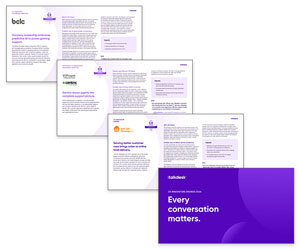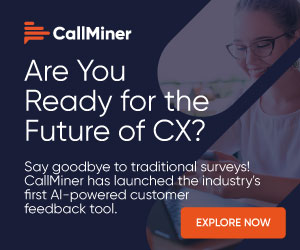According to our latest Call Centre Helper research, over 20% of contact centres are using ChatGPT – up from 10% in 2023 – but is it really suitable for contact centres right now? Or is there still a long way to go?
To find out, we asked our panel of experts. Here’s what they shared about the good, the bad, and the ugly…
The Good
87% of IT Leaders Recognize Its Role in Boosting Overall Productivity
Solutions like ChatGPT, a mix of conversational and generative AI, are rapidly transforming customer service, with 87% of IT leaders recognizing its role in boosting overall productivity.
At the forefront of its benefits is speed. By handling mundane tasks, it frees up human agents to focus on what matters the most: building rapport and providing the emotional connection that customers often crave.
Contributed by: Jonathan Mckenzie, Senior AI Contact Centre Product Manager at 8×8
It Can Improve QA With Efficiency, Scalability, and Objectivity
If a contact centre is manually evaluating and scoring calls, ChatGPT can be a significant enhancement as a semi-automated QA option by improving efficiency, scalability, and objectivity.
The AI can process and score call transcripts much faster than human reviewers, which accelerates the QA process and allows for the review of a larger volume of calls.
Contributed by: Victoria Piazza, Marketing Manager, MiaRec
Purpose-Built AI Will Generate Accurate, Appropriate, and Relevant Responses

Contact centres should only use purpose-built AI for customer experience, not generic AI built from the open internet.
This is the only way to ensure that the AI will generate accurate, appropriate and relevant responses.
This is because purpose-built AI is built with the proper guardrails for things like brand constitution and is trained only on CX-specific, business-specific data.
Contributed by: Catherine Forino, Senior Product Marketing Manager, NICE
74% of Internet Users Prefer to Use Chatbots for Straightforward Queries
The benefits of chatbot solutions like ChatGPT are not limited to human agents alone. In fact, 74% of internet users prefer to use chatbots for straightforward queries.
Conversational AI solutions are also capable of analysing customer preferences, offering tailored product recommendations, and suggesting the most appropriate actions in real-time.
Contributed by: Jonathan Mckenzie, Senior AI Contact Centre Product Manager at 8×8
ChatGPT Can Help Streamline Agent Scheduling

For contact centre managers, manual scheduling is extremely tedious, labour-intensive, and prone to human errors.
Using ChatGPT for this can streamline the process, although it is not a substitute for comprehensive workforce management (WFM) platforms.
ChatGPT can automate and optimize scheduling by efficiently managing constraints such as agent availability, peak hours, and skill requirements.
This automation saves time and adapts quickly to unexpected changes, such as sudden absences or shifts in call volume, providing better coverage and flexibility.
Contributed by: Victoria Piazza, Marketing Manager, MiaRec
The Term “Google It” Will Be Replaced With “GPT It”
Think about the term “Google it”. It will soon be replaced with something like “GPT it”.
It can provide faster, more accurate responses – often to queries that do not require the agent touch.
Contributed by: Kevin McGachy, Head of AI Solutions, Sabio Group
The Bad
Silos Across the Contact Centre Can Limit the Effectiveness of ChatGPT
Poor quality or siloed data will severely limit the effectiveness of generative AI in contact centres. If trained on outdated, incomplete, or inconsistent data, the AI output will reflect these flaws, producing at best inaccurate or unhelpful responses.
Furthermore, when data is trapped in silos across different departments, AI lacks the comprehensive information needed to provide meaningful support.
Without quality data, generative AI could do you as much good as a chocolate fireguard.
Contributed by: Agam Kohli, Sales Engineering Director, Odigo UK
We Need to Build Restraints Around the Knowledge Each Model Has Access To

The vast knowledge base being used to power AI capability is actually a negative. For example, when calling your bank, you wouldn’t expect it to know about glacier erosion, for example, so why should the bank’s Gen AI have access to that knowledge?
What we need to do as an industry is build restraints around the knowledge and what each model has access to – so specific financial services knowledge for a bank, aviation knowledge for an airline, etc.
This will increase the accuracy and speed of responses, and this is where we will see more specialized models (or SLM, Small Language Models) come to the fore.
Contributed by: Kevin McGachy, Head of AI Solutions, Sabio Group
It’s More Common for Chatbots to Hallucinate on Bad Data
If contact centres use generic AI, they run the risk of generating bad responses.
We’ve seen examples of this recently with chatbots for well-known brands spewing incorrect statements to customers.
It’s more common for chatbots to hallucinate when they are not trained on good data, but optimizing your CX operations with purpose-built AI for CX can help.
Contributed by: Catherine Forino, Senior Product Marketing Manager, NICE
Human Empathy and Judgement Remain Crucial for Resolving Complex Issues

Ultimately, GenAI can augment contact centres, but it’s not a silver bullet.
It shouldn’t replace human agents entirely.
Human empathy, adaptability, problem-solving skills and judgement remain crucial for resolving complex issues and maintaining customer relationships.
A blended approach, combining human agents with AI, alongside careful planning, testing, and ongoing monitoring, will mitigate risks and maximize benefits.
Contributed by: Steve Nattress, Vice President of Product Management, Enghouse Interactive
It Takes a Lot of Data to Provide Valuable Insights
AI, in general, can certainly help streamline repetitive tasks, and when it comes to extracting insights from contact centre data, AI definitely has its place.
It’s relatively easy to get AI models or chatbots up and running using ChatGPT’s large language models (LLMs) too.
However, making them truly ready for customer interactions is a different story. It takes a massive amount of data for AI models to start providing valuable insights for your business.
Contributed by: Matthew Yates, VP Engineering, MaxContact
And the Ugly
You Need to Bulletproof Your Data Security Measures

While the benefits of ChatGPT are evident, the potential risks of deploying such technologies cannot be ignored.
Trusting an AI with sensitive info means you need to bulletproof your data security measures.
One slip, and it may lead to significant consequences.
That is why it is crucial for businesses to maintain rigorous data oversight at all times.
Contributed by: Jonathan Mckenzie, Senior AI Contact Centre Product Manager at 8×8
The Illusion of Human-Like Interactions Can Create Unrealistic Customer Expectations
LLMs should be approached with caution. The illusion of human-like interactions can create unrealistic customer expectations.
The nature of the technology may lead to plausible sounding but incorrect answers, and biases in training data can result in discriminatory responses. Data privacy and data sovereignty must also be considered.
Contributed by: Steve Nattress, Vice President of Product Management, Enghouse Interactive
Agents Shouldn’t Get Lured Into the Trap of Using AI as the Ultimate Shortcut
Generative AI can help agents overcome writer’s block by getting something down on ‘paper’ quickly, allowing agents to focus on refining and personalizing the message.
Generative AI generates errors too, so agents still need to engage their brains and not get lured into the trap of using AI as the ultimate shortcut.
AI output is an advanced draft to be tailored and approved before sending to customers.
Using ChatGPT to Handle Medical or Legal Advice Is Risky

Using generative AI to handle sensitive queries such as medical or legal advice, vulnerability, and mental health support is at best risky, but in many cases it is downright inappropriate.
Even if generative AI could give technically accurate medical or legal advice all the time, it takes human connection and intuition to keep customers engaged and talking for long enough to uncover the full story and gather the critical information vital for support care.
Contributed by: Agam Kohli, Sales Engineering Director, Odigo UK
Toxic Chatbot Responses Are Still Possible – Including Hate Speech
Despite its impressive ability to answer questions with human-like language, AI-generated responses are not foolproof. There can be instances of bias or errors in the information provided.
For example, ChatGPT users in the UK have recently received responses in Welsh to English-language queries.
In more serious cases, toxic chatbot responses, such as hate speech or inappropriate suggestions, can occur. This highlights the importance of monitoring and filtering AI interactions to prevent harm.
Contributed by: Jonathan Mckenzie, Senior AI Contact Centre Product Manager at 8×8
Some Versions of ChatGPT Store Input Information Indefinitely

As a business, it’s crucial to understand how your customers’ data is being processed to ensure compliance with data regulations in your country, such as GDPR in the UK.
If you’re handling personally identifiable information, you need to know exactly how ChatGPT processes that data. Keep in mind that some versions of ChatGPT store input information indefinitely unless users opt out.
Contributed by: Matthew Yates, VP Engineering, MaxContact
What’s Your Experience of Using ChatGPT So Far?
Are you experiencing the good, the bad, or the ugly? Join our community group on LinkedIn and let us know!
For more great insights and advice from our panel of experts, read these articles next:
- Master Seasonal Service Levels – Just Like This!
- Ease Agent Stress – With These 15 Top Tips!
- Is AI Really a Game-Changer in Knowledge Management?
Author: Robyn Coppell
Reviewed by: Xander Freeman
Published On: 9th Sep 2024 - Last modified: 16th Sep 2024
Read more about - Technology, 8x8, Agam Kohli, Artificial Intelligence, Catherine Forino, ChatGPT, Editor's Picks, Enghouse Interactive, Jonathan Mckenzie, Kevin McGachy, Matthew Yates, MaxContact, MiaRec, NICE, Odigo, Sabio, Steve Nattress, Top Story, Top Technology Stories, Victoria Piazza









































